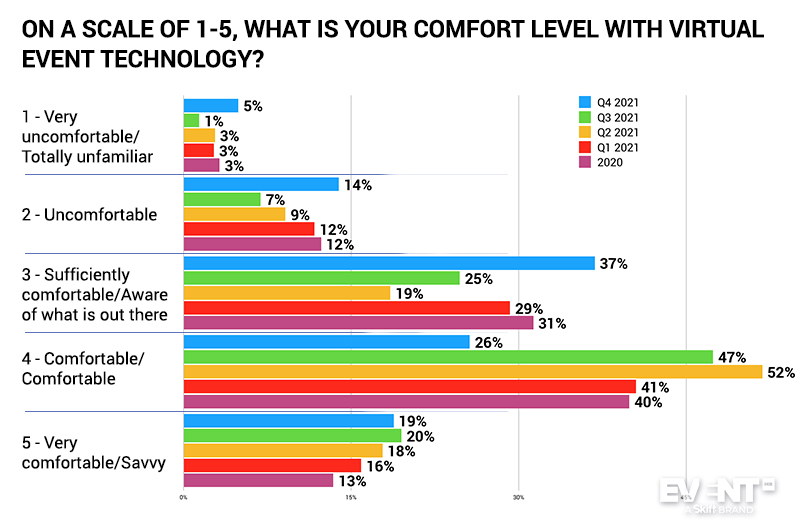Among the many interesting findings from our State of the Event Industry Report, one of the most noteworthy results concerned self-reported comfort levels with event tech. While we might expect event professionals to become increasingly comfortable with event tech as more and more organizations shift to virtual and hybrid formats, that’s not what’s happening — at least not according to answers from the most recent State of the Event Industry survey.
Self-reported comfort levels rose between Q4 of 2020 and Q1 of 2021, edged up a bit further in Q2, and then seemed to plateau in Q3 (with a bit of shuffling between the top three answers). In Q4, however, the overall trend was clearly downward. In fact, comfort levels were ranked even lower than they had been at the end of 2020.
Could it be that event professionals are facing a new learning curve with event tech companies adding more and more bells and whistles to their products? Or are the products themselves falling short of expectations in ways that test the problem-solving skills of event planners? Alternatively, could the shift towards hybrid formats have thrown event planners yet another curveball?
Event Tech CEO Responds to Worrying Survey Results
To understand the issues better, deputy editor Angela Tupper sat down with Pierre Metrailler, CEO of SpotMe, for an insider’s perspective.
Angela Tupper: Have you seen any evidence that event professionals are becoming less comfortable with event tech?
Pierre Metrailler: I have one relevant piece of data from my side. We offer an event tech RFP template. The downloads of that RFP template were very high in early 2020, and then slowly declined for a while. But right now it is at its highest. This indicates that people are out there on the market buying event tech — and looking for new providers, presumably because they’re unhappy with past experiences. Most people I’ve talked to have tried between three to five different vendors for executing the same thing. People have a lot of exposure to products like live-streaming tools, but the experience hasn’t been great.
AT: Have you seen any other signs of trouble in the wider industry?
PM: Amazon had some outages over the past couple of weeks, and at least one tech vendor was pretty deeply impacted. I saw someone tweet, “I’ve had enough of the bells and whistles of those event platforms. I’m now going back to Zoom.” There is a deep issue with reliability. And it’s so important because event tech used to be a thing on the side, but now it is literally the venue.
AT: Are unreliable live streams the main issue, or is there a wider problem?
PM: Another major issue is that many vendors have been selling features they don’t have because it was such a race to keep up with advances and move to hybrid. But the reality is that nobody was ready for this, and people were tempted to overpromise and under-deliver. As a result, trust has eroded. Two to three years ago, you could show prospective customers slides of what you could do, and that would be enough. Now, they want to see exactly how it works, and they ask for references from three people who’ve used it.
AT: Is it partly a question of some features still being test-driven, or does it run deeper than that?
PM: I’m not on the buying side, so I can only speculate. But what I’m hearing is that features are not yet complete or working as they’re supposed to. Reading between the lines, it’s clear that customers have had issues in the past. They might ask, “Do you have breakout rooms?” When we answer yes, we get a whole set of further questions. “How many people can be a speaker? How many can participate as attendees? Have you tested browser compatibility?” Such precise questions suggest that they had problems with these particular issues using past providers. I don’t think the vendors were necessarily lying, but maybe their tech just wasn’t mature yet.
AT: Could it also partly be a question of growing pains within the internal teams of event tech companies? Although some event planning teams might have needed to cut back on staff over the last two years, many event tech companies have had the opposite issue: They’ve had to expand quickly. Will tech companies have to be more careful about what their sales teams are promising to clients?
PM: It is hard to find people with the right combination of skills. 18 months ago, how many event planners knew what RTMP was? None. I saw a post about this from Dahlia el Gazzar recently. She was saying that there’s a lot of demand for event technology right now, so you have to hire new salespeople — and they don’t grow on trees. So where do you get them? Do you take somebody who is not from the event industry but who has experience in SaaS [software as a service]? Or do you take somebody from an event management background? What Dahlia was saying is that both options are not great. Somebody who’s not from the industry won’t understand the needs of event professionals. But someone from the industry might not understand the tech. There’s a learning curve that will take time.
AT: One of the survey results asked respondents to predict which types of events will dominate in the future, and hybrid still came out as the top answer even though it has slipped a few percentage points lower over the last year. Do you think that the shift to hybrid formats might also be contributing to a decline in comfort levels? If so, might that influence the popularity of hybrid formats in 2022?
PM: I think it’s just a disagreement about what hybrid means. Some might not consider an event with remote attendees and in-person speakers to be hybrid. And some have the idea that hybrid somehow means teleporting speakers in with holograms — even with virtual reality thrown into the mix.
AT: Interestingly, the number of respondents predicting that future events will be virtual has jumped up by 14 percent over the last year. Do you think that some event organizers might be tempted to go back to the “tried and tested” online engagement models of 2020 because hybrid events are perceived as more challenging?
PM: It could be a simple business argument. Certain industries have just decided that virtual is the way to go. Imagine that you’re the CFO of a Fortune 500 company. If virtual events end up costing 20 percent of what you once spent on in-person events, and your sales are still going up 3, 5, 6, 7 percent a year — the incentive is clear. For example, I’ve seen it work well for organizations in the life sciences. But it doesn’t work for all events. It’s not a great solution for anyone doing incentive, hospitality, and FAM trips. Still, there are a number of industries that’ve had a lot of success with virtual and seem very committed to it.
If you would like to learn more about key findings from EventMB’s State of the Event Industry survey, download the full 2021 report here.
___
All the relevant data:






